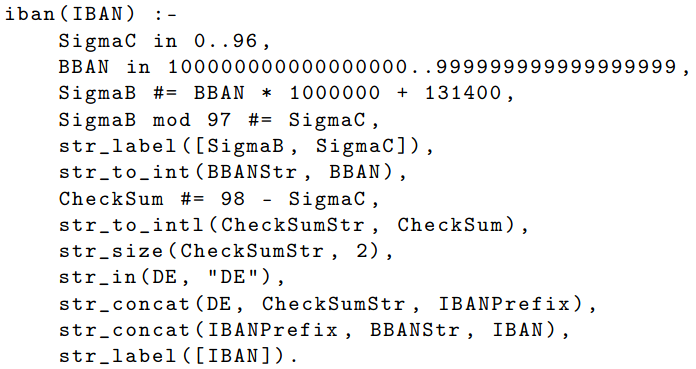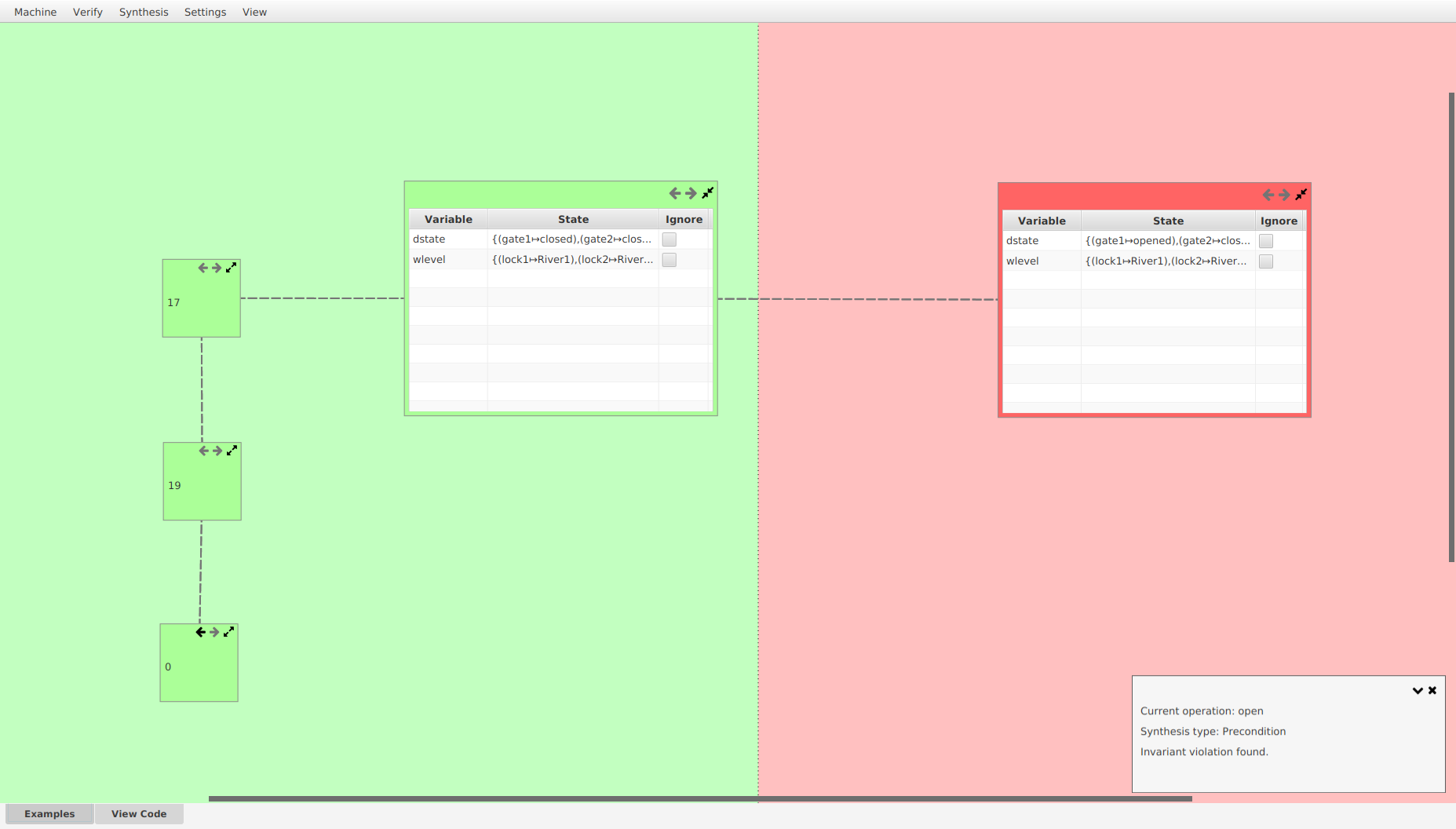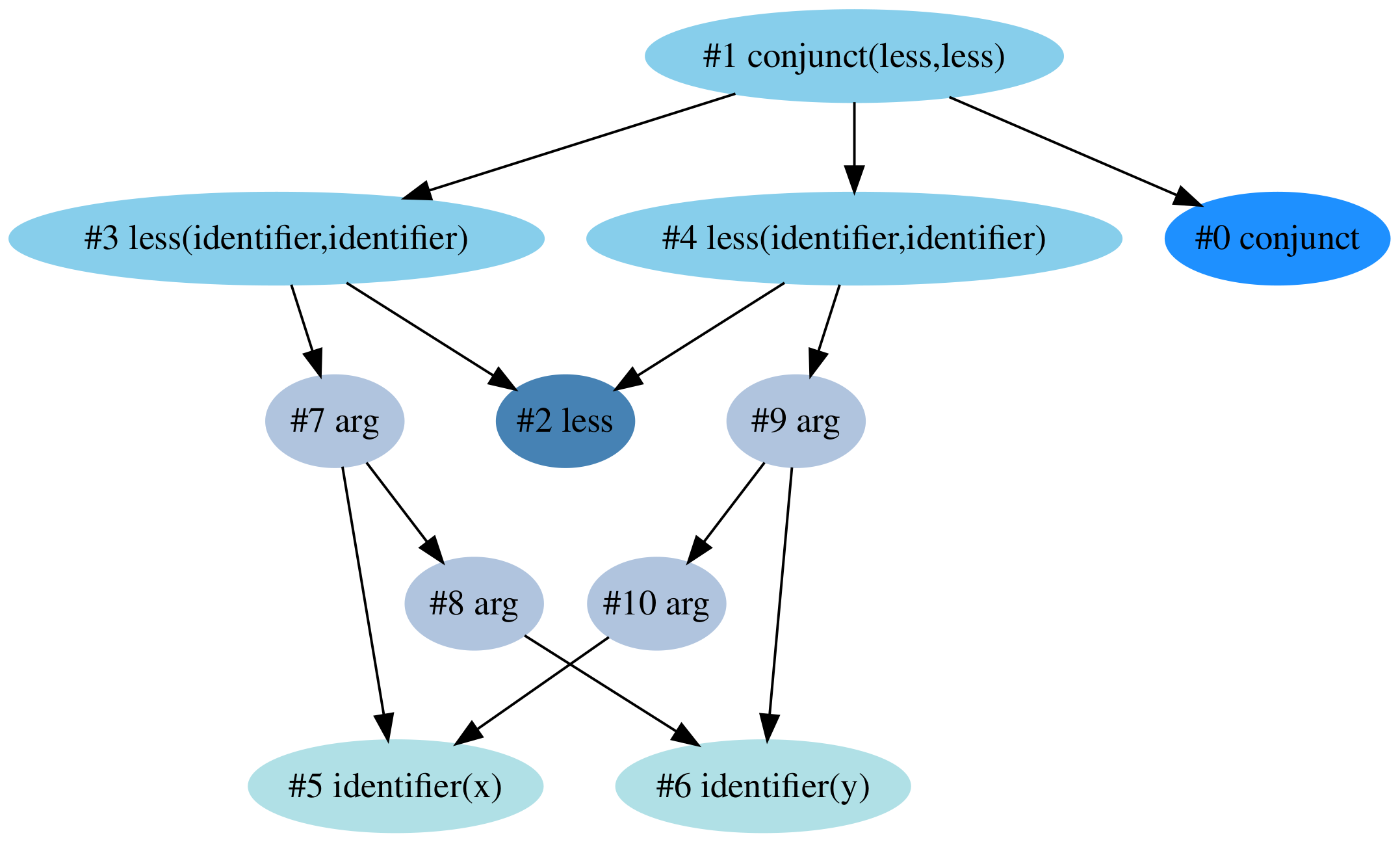Sitemap
A list of all the posts and pages found on the site. For you robots out there is an XML version available for digesting as well.
Pages
portfolio
The ProB Animator and Model Checker
ProB is an animator, constraint solver and model checker for the B-Method. The constraint-solving capabilities of ProB can be used for animation, model finding, constraint-based symbolic checking and test-case generation.
VertiGo - Ad-hoc medical help for dizziness patients on mobile devices using AI
In the VertiGo project, a mobile videonystagmography for smartphones has been developed, which can be used independently without medical specialists, regardless of time and location. This project was an interdisciplinary joint work with the University Hospital of Düsseldorf.
ConString - A string constraint solver for SWI-Prolog
In this project, we introduced a new string constraint solver for SWI-Prolog having interfaces to CLP(FD), CLP(B) and CLP(R) for generating strings containing integers, booleans and reals. This project was a joint work with the Niederrhein University of Applied Sciences and the periplus instruments GmbH & Co. KG.
PlÜS - Scheduling Tool for overlapping-free studying
PlÜS is a timetable validation tool created with the goal of importing, validating and improving existing university timetables at the University of Düsseldorf. This project was an interdisciplinary joint work with the Faculty of Arts and Humanities at the University of Düsseldorf.
ProBramSynthesis - Program Synthesis for B in ProB
In this project, I implemented a program synthesis technique in ProB using constraint logic programming for the interactive repair and generation of formal models including a graphical user interface.
Fuzzing of Prolog Programs
In this project, I implemented a fuzzer for SICStus Prolog including an extension to generate classical B and Event-B predicates and expressions represented as abstract syntax trees.
publications
Interactive Model Repair by Synthesis
Published in Proceedings ABZ (International Conference on Rigorous State Based Methods), 2016
This short paper is the original idea of using program synthesis for interactive model repair of formal models using the B-Method.
Joshua Schmidt, Sebastian Krings and Michael Leuschel. (2016). "Interactive Model Repair by Synthesis" Proceedings ABZ (International Conference on Rigorous State Based Methods). https://link.springer.com/chapter/10.1007/978-3-319-33600-8_25
A Translation from Alloy to B
Published in Proceedings ABZ (International Conference on Rigorous State Based Methods), 2018
In this paper, we introduce a translation of the specification language Alloy to classical B.
Sebastian Krings, Joshua Schmidt, Carola Brings, Marc Frappier and Michael Leuschel. (2018). "A Translation from Alloy to B" Proceedings ABZ (International Conference on Rigorous State Based Methods). https://link.springer.com/chapter/10.1007/978-3-319-91271-4_6
Repair and Generation of Formal Models Using Synthesis
Published in Proceedings ABZ (International Conference on Rigorous State Based Methods), 2018
This paper is the follow-up work regarding the use of program synthesis for the interactive repair and generation of formal models using the B-Method.
Joshua Schmidt, Sebastian Krings and Michael Leuschel. (2018). "Repair and Generation of Formal Models Using Synthesis" Proceedings ABZ (International Conference on Rigorous State Based Methods). https://link.springer.com/chapter/10.1007/978-3-319-91271-4_6
Measuring Coverage of Prolog Programs Using Mutation Testing
Published in Proceedings WFLP (International Workshop on Functional and (Constraint) Logic Programming), 2019
In this paper, we introduce a framework for Prolog programs measuring test coverage using mutations.
Alexandros Efremidis, Joshua Schmidt, Sebastian Krings and Philipp Körner. (2019). "Measuring Coverage of Prolog Programs Using Mutation Testing" Proceedings WFLP (International Workshop on Functional and (Constraint) Logic Programming). https://link.springer.com/chapter/10.1007/978-3-030-16202-3_3
Experience Report on an Inquiry-Based Course on Model Checking
Published in Proceedings CEUR (Tagungsband des 16. Workshops "Software Engineering im Unterricht der Hochschulen"), 2019
In this paper, we present a recent revision of our course on model checking at the University of Düsseldorf, shifting from a classical lecture-based format to inquiry and research-based teaching.
Sebastian Krings, Philipp Körner and Joshua Schmidt. (2018). "Experience Report on an Inquiry-Based Course on Model Checking" Proceedings CEUR (Tagungsband des 16. Workshops "Software Engineering im Unterricht der Hochschulen"). https://ceur-ws.org/Vol-2358/
Automated Backend Selection for ProB Using Deep Learning
Published in Proceedings NFM (International Symposium on NASA Formal Methods), 2019
In this paper, we use machine learning methods to automate the backend selection for the ProB model checker. In particular, we explore different approaches to deep learning and outline how we apply them to find a suitable backend for given input constraints.
Jannik Dunkelau, Sebastian Krings and Joshua Schmidt. (2018). "Automated Backend Selection for ProB Using Deep Learning" Proceedings NFM (International Symposium on NASA Formal Methods). https://link.springer.com/chapter/10.1007/978-3-030-20652-9_9
Translating Alloy and Extensions to Classical B
Published in International Journal on Science of Computer Programming, 2020
This a follow-up article in which we introduce a denotational translation of the specification language Alloy to classical B including different Alloy extensions.
Sebastian Krings, Michael Leuschel, Joshua Schmidt, David Schneider and Marc Frappier. (2020). "Translating Alloy and Extensions to Classical B" International Journal on Science of Computer Programming. https://link.springer.com/chapter/10.1007/978-3-030-20652-9_9
Towards Constraint Logic Programming over Strings for Test Data Generation
Published in Proceedings WLP (Workshop on (Constraint) Logic Programming), 2020
In this paper, we evaluate to what extent constraint logic programming can be used to generate test data, focusing on strings in particular.
Sebastian Krings, Joshua Schmidt, Patrick Skowronek, Jannik Dunkelau and Dierk Ehmke. (2020). "Towards Constraint Logic Programming over Strings for Test Data Generation" Proceedings WLP (Workshop on (Constraint) Logic Programming). https://link.springer.com/chapter/10.1007/978-3-030-46714-2_10
Analysing ProB's Constraint Solving Backends
Published in Proceedings ABZ (International Conference on Rigorous State Based Methods), 2020
We evaluate the strengths and weaknesses of different backends of the ProB constraint solver. For this, we train a random forest over a database of constraints to classify whether a backend is able to find a solution within a given amount of time or answers unknown.
Jannik Dunkelau, Joshua Schmidt and Michael Leuschel. (2020). "Analysing ProB's Constraint Solving Backends" Proceedings ABZ (International Conference on Rigorous State Based Methods). https://link.springer.com/chapter/10.1007/978-3-030-48077-6_8
VertiGo - a pilot project in nystagmus detection via webcam
Published in Current Directions in Biomedical Engineering, 2020
The aim of this study was to detect horizontal vestibular nystagmus utilizing a webcam. In the feasibility study, caloric induced vestibular nystagmus was recorded with conventional video-nystagmography and webcam.
Sophia Reinhardt, Joshua Schmidt, Michael Leuschel, Christiane Schüle and Jörg Schipper. (2020). "VertiGo – a pilot project in nystagmus detection via webcam" Current Directions in Biomedical Engineering. https://www.degruyter.com/document/doi/10.1515/cdbme-2020-0043/html
Improving SMT Solver Integrations for the Validation of B and Event-B Models
Published in Proceedings FMICS (International Conference on Formal Methods for Industrial Critical Systems), 2021
In this paper, we substantially improve the translation from B to SMT-LIB by employing a more constructive rather than axiomatised style using Z3’s lambda functions. We further extend ProB’s interface to Z3 to run different solver configurations in parallel, e.g., either using the former or new translation.
Joshua Schmidt and Michael Leuschel. (2021). "Improving SMT Solver Integrations for the Validation of B and Event-B Models" Proceedings FMICS (International Conference on Formal Methods for Industrial Critical Systems). https://link.springer.com/chapter/10.1007/978-3-030-85248-1_7
SMT solving for the validation of B and Event-B models
Published in International Journal on Software Tools for Technology Transfer, 2022
This is a follow-up work where we additionally present a direct implementation of SMT solving in Prolog using ProB’s constraint solver as a theory solver. We hereby aim to combine the strengths of conflict-driven clause learning for identifying contradictions with ProB’s constraint solver for finding solutions.
Joshua Schmidt and Michael Leuschel. (2022). "SMT solving for the validation of B and Event-B models" International Journal on Software Tools for Technology Transfer. https://link.springer.com/article/10.1007/s10009-022-00682-y
Clinical Nystagmus Characteristics - Distribution of Intensity Components in Acute Vertigo Patients
Published in Laryngo-Rhino-Otologie, 2023
For the evaluation of vestibular function, videonystagmography (VNG) is considered the gold standard in addition to subjective examination with Frenzel glasses. The intensity components are frequency and SPV (slow phase velocity) of the nystagmus. Currently, there are no clear values for the normal distribution of these parameters.
Elena Schulte, Sophia Reinhardt, Christian Hartmann, Joshua Schmidt, Jonas Schneider, Michael Leuschel, Christiane Schüle and Jörg Schipper. (2023). "Clinical Nystagmus Characteristics - Distribution of Intensity Components in Acute Vertigo Patients" Laryngo-Rhino-Otologie 102, 94th Annual Meeting German Society of Oto-Rhino-Laryngology, Head and Neck Surgery e. V.. https://www.thieme-connect.de/products/ejournals/abstract/10.1055/s-0043-1766830
Smartphone-Based Videonystagmography Using Artificial Intelligence
Published in Current Directions in Biomedical Engineering, 2023
We present a novel location- and time-independent mobile application for videonystagmography (VNG) to support vertigo patients and medical staff. No additional hardware is necessary. The app uses artificial intelligence for eye tracking and to detect a horizontal nystagmus.
Sophia Reinhardt, Joshua Schmidt, Jonas Schneider, Elena Schulte, Christiane Schüle, Michael Leuschel and Jörg Schipper. (2022). "Smartphone-Based Videonystagmography Using Artificial Intelligence" Current Directions in Biomedical Engineering. https://www.degruyter.com/document/doi/10.1515/cdbme-2023-1132/html
New Applications and Techniques for Constraint Programming in B
Published in Universitäts- und Landesbibliothek Düsseldorf, 2023
In the first part, a translation of a popular formal specification language called Alloy to classical B is presented, which is automated by ProB. The second part of this thesis deals with constraint solving, which is one of the most important features of any formal verification tool.
Joshua Schmidt. (2023). "New Applications and Techniques for Constraint Programming in B" Dissertation. Universitäts- und Landesbibliothek Düsseldorf. https://docserv.uni-duesseldorf.de/servlets/DocumentServlet?id=64042
Can a smartphone app with AI replace the VNG in caloric testing?
Published in Laryngo-Rhino-Otologie, 2024
Dizziness is one of the most common symptoms in medicine, but the diagnosis is very complex and depends on the examiner's expertise. In addition, this experience and expensive, equipment-based, error-prone diagnostics are not available across the country. An Android smartphone app was developed that can be used by oneself or third parties for videonystagmography (VNG). VNG was carried out on 19 healthy volunteers at rest and after caloric testing of each ear in a conventional manner and using the smartphone app.
Sophia Reinhardt, Joshua Schmidt, Jonas Schneider, Elena Schulte, Michael Leuschel, Christiane Schüle and Jörg Schipper. (2023). "Can a smartphone app with AI replace the VNG in caloric testing?" Laryngo-Rhino-Otologie 103, 95th Annual Meeting German Society of Oto-Rhino-Laryngology, Head and Neck Surgery e. V., Bonn. https://www.thieme-connect.de/products/ejournals/abstract/10.1055/s-0044-1784589
talks
Seminar Talk: Constraint Logic Programming - Consistency and Search
Published:
I gave a seminar talk on constraint logic programming in the context of artificial intelligence.
Seminar Talk: Recognition and Representation of Three-Dimensional Objects and Their Pose
Published:
I gave a seminar talk on the recognition and representation of three-dimensional objects and their pose in the context of augmented reality.
Conference Proceeding Talk: A Translation from Alloy to B
Published:
I presented our original work of translating Alloy to B at the 6th International Conference on Rigorous State Based Methods (ABZ) in 2018.
Conference Proceeding Talk: Repair and Generation of Formal Models Using Synthesis
Published:
I presented our original work of the interactive repair and generation of formal models using program synthesis at the 14th International Conference on integrated Formal Methods (iFM) in 2018.
Conference Proceeding Talk: Improving SMT Solver Integrations for the Validation of B and Event-B Models
Published:
I presented our work of improving ProB’s SMT solver integrations for the validation of B and Event-B models at the 26th International Conference on Formal Methods for Industrial Critical Systems (FMICS) in 2021. The paper was nominated for the best paper award.
Seminar Talk: Overview of Autonomous Driving Technologies
Published:
I gave a seminar talk on autonomous driving technologies with a focus on the software and artificial intelligence.
Conference Proceeding Talk: Smartphone-Based Videonystagmography Using Artificial Intelligence
Published:
I presented our work on a smartphone-based videonystagmography using artificial intelligence at the 57th DGBMT annual conference on biomedical engineering (Deutsche Gesellschaft für Biomedizinische Technik im VDE).
teaching
Introduction to Logic Programming
Undergraduate and Postgraduate course, University of Düsseldorf, 2015
In imperative programming languages, programs are represented as sequences of instructions. In logic programming, one describes the solution for a problem as facts and rules instead of writing an algorithm. The computer then finds a solution autonomously. This offers a new and radically different point of view towards programming, useful even for the every day programmer using C or Java.
Practical Programming Course
Undergraduate course, University of Düsseldorf, 2016
This practical programming course dealt with general topics of software development as well as object-oriented programming and Java in particular.
Model Checking
Postgraduate course, University of Düsseldorf, 2018
This course dealt with the fully automatic verification of hardware and software using model checking algorithms and tools.
Overview Artificial Intelligence
Undergraduate course, University of Düsseldorf, 2020
This course covered the basics of artificial intelligence ranging from classic symbolic AI to modern techniques such as deep learning. Problems and limitations of current AI approaches such as bias, explainability, security and others were discussed. Further content was determined in consultation with the students.
Supervised Theses
Undergraduate and Postgraduate course, University of Düsseldorf, 2024
During my work as a researcher at the chair of software engineering and programming languages at the University of Düsseldorf I supervised several theses as can be seen in the following.
